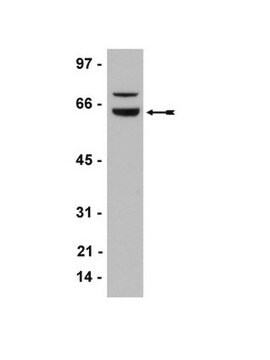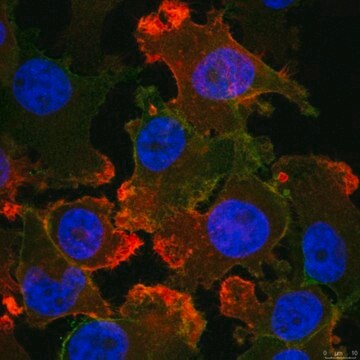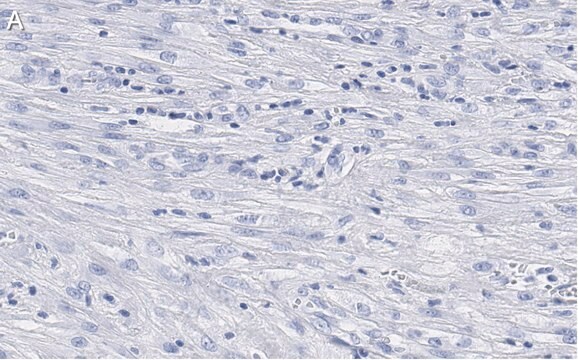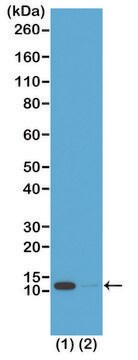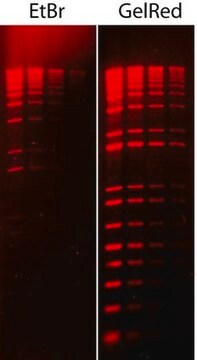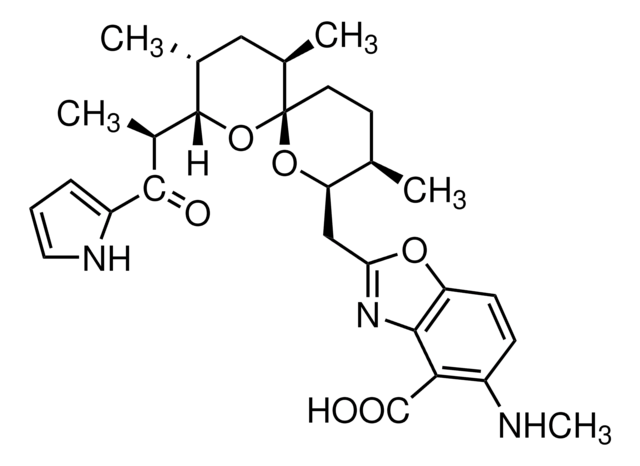P8122
Anti-Potassium Channel KIR3.2 (GIRK2) antibody produced in rabbit
affinity isolated antibody, lyophilized powder
别名:
Anti-BIR1, Anti-GIRK-2, Anti-GIRK2, Anti-KATP-2, Anti-KATP2, Anti-KCNJ7, Anti-KIR3.2, Anti-KPLBS, Anti-hiGIRK2
登录查看公司和协议定价
所有图片(2)
About This Item
共軛:
unconjugated
application:
WB
無性繁殖:
polyclonal
物種活性:
mouse, rat
citations:
8
技術:
western blot: 1:200 using rat brain membranes
推荐产品
生物源
rabbit
品質等級
共軛
unconjugated
抗體表格
affinity isolated antibody
抗體產品種類
primary antibodies
無性繁殖
polyclonal
形狀
lyophilized powder
物種活性
mouse, rat
技術
western blot: 1:200 using rat brain membranes
UniProt登錄號
運輸包裝
dry ice
儲存溫度
−20°C
目標翻譯後修改
unmodified
基因資訊
human ... KCNJ6(3763)
mouse ... Kcnj6(16522)
rat ... Kcnj6(25743)
一般說明
G protein-activated inward rectifier potassium channel 2 (GIRK2) is localized on the plasma membrane. It is expressed majorly in the brain and to some extent in the pancreas. The GIRK2 gene is mapped to human chromosome 21q22.13. Structurally, GIRK2 exists as a tetramer and comprises a transmembrane domain and a cytoplasmic domain.
特異性
Anti-Potassium Channel KIR3.2 (GIRK2) recognizesKIR3.2 (GIRK2).
免疫原
GST fusion protein with sequence corresponding to residues 374-414 of mouse KIR3.2 (GIRK2). Sequence homology is 40/41, 39/41, and 37/41 residues identical in rat, golden hamster, and human, respectively.
應用
Anti-Potassium Channel KIR3.2 (GIRK2) antibody produced in rabbit has been used in:
- immunoblotting
- immunofluorescence
- immunocytochemistry
生化/生理作用
G protein-activated inward rectifier potassium channel 2,(GIRK2) plays a key role in γ-aminobutyric acid-ergic (GABAergic), dopaminergic, cholinergic, and glutamatergic synapses. It also regulates neuronal excitability. GIRK2 through G protein-coupled receptor stimulation modulates neuronal circuit activity and heart rate in cardiac cells. Deletion of the GIRK2 gene in mice may lead to an anxiety-like phenotype and a depression-resistant behavior.
外觀
Lyophilized powder from phosphate buffered saline containing 1% bovine serum albumin and 0.05% sodium azide.
免責聲明
Unless otherwise stated in our catalog or other company documentation accompanying the product(s), our products are intended for research use only and are not to be used for any other purpose, which includes but is not limited to, unauthorized commercial uses, in vitro diagnostic uses, ex vivo or in vivo therapeutic uses or any type of consumption or application to humans or animals.
未找到合适的产品?
试试我们的产品选型工具.
儲存類別代碼
13 - Non Combustible Solids
水污染物質分類(WGK)
WGK 2
閃點(°F)
Not applicable
閃點(°C)
Not applicable
Chella Kamarajan et al.
International journal of psychophysiology : official journal of the International Organization of Psychophysiology, 115, 13-23 (2016-12-21)
Event related oscillations (EROs) are heritable measures of neurocognitive function that have served as useful phenotype in genetic research. A recent family genome-wide association study (GWAS) by the Collaborative Study on the Genetics of Alcoholism (COGA) found that theta EROs
Nerea Llamosas et al.
The international journal of neuropsychopharmacology, 18(11), pyv051-pyv051 (2015-05-10)
Targeting dorsal raphe 5-HT1A receptors, which are coupled to G-protein inwardly rectifying potassium (GIRK) channels, has revealed their contribution not only to behavioral and functional aspects of depression but also to the clinical response to its treatment. Although GIRK channels
S P Jackson et al.
Molecular and cellular biology, 8(3), 1067-1075 (1988-03-01)
Strains of Saccharomyces cerevisiae that bear the temperature-sensitive mutation rna8-1 are defective in nuclear pre-mRNA splicing at the restrictive temperature (36 degrees C), suggesting that the RNA8 gene encodes a component of the splicing machinery. The RNA8 gene was cloned
Carlo Corona et al.
The Journal of neuroscience : the official journal of the Society for Neuroscience, 38(27), 6102-6113 (2018-06-08)
Activating Transcription Factor 4 (ATF4) has been postulated as a key regulator of learning and memory. We previously reported that specific hippocampal ATF4 downregulation causes deficits in synaptic plasticity and memory and reduction of glutamatergic functionality. Here we extend our
G protein regulation of potassium ion channels.
M Yamada et al.
Pharmacological reviews, 50(4), 723-760 (1998-12-22)
我们的科学家团队拥有各种研究领域经验,包括生命科学、材料科学、化学合成、色谱、分析及许多其他领域.
联系技术服务部门

